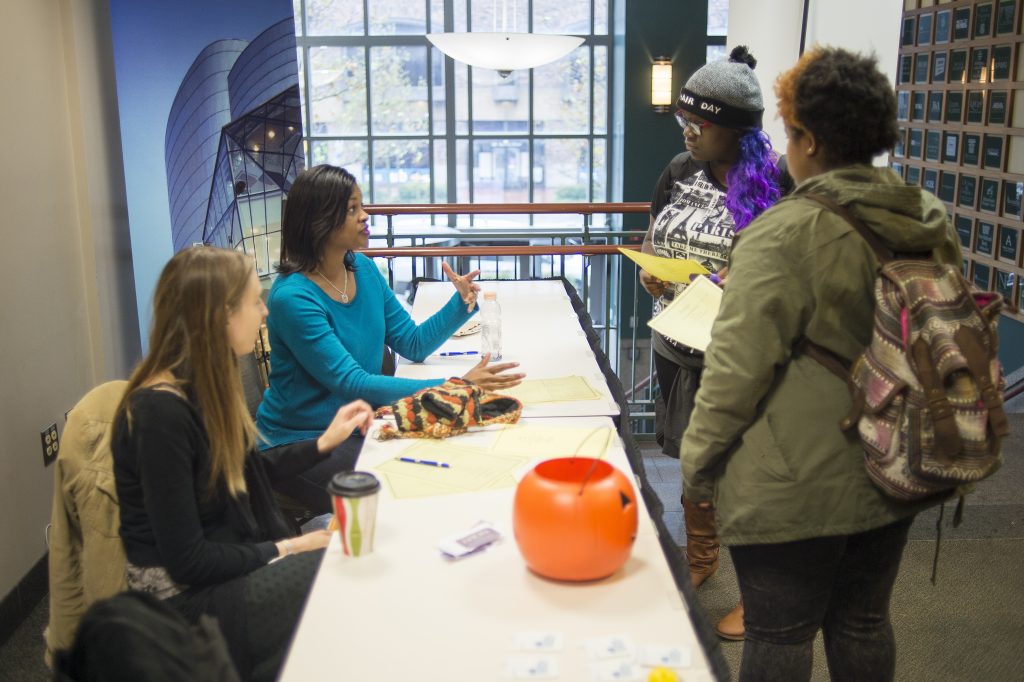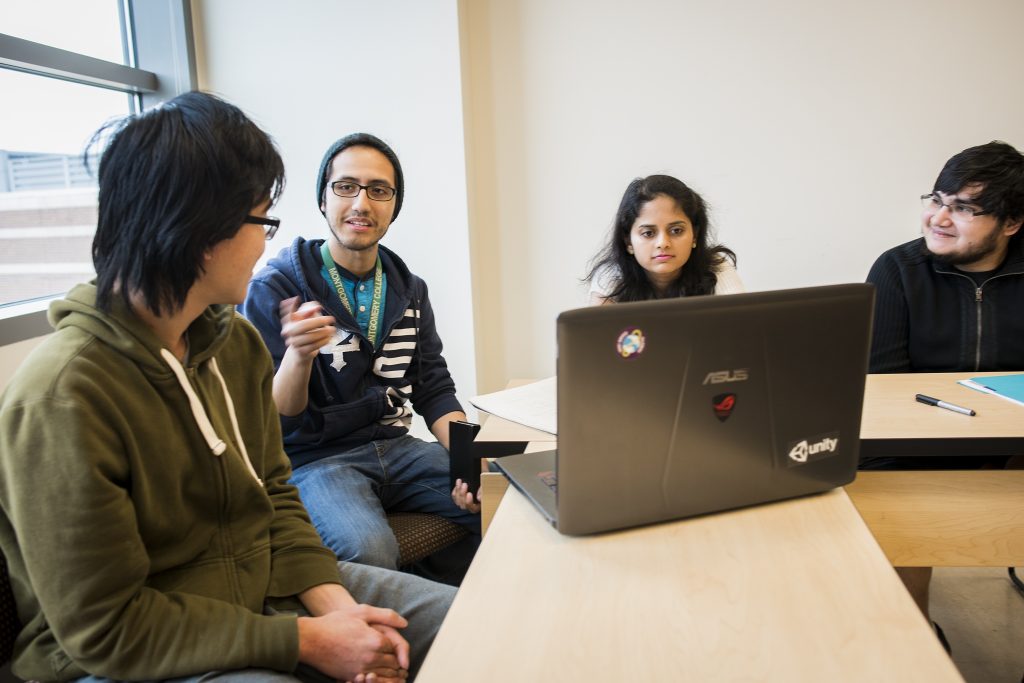Chapter 9: Socializing

Benefits of Social Interaction in College
If you were to ask fellow students what they think are the greatest benefits of social interaction in college, you would probably get a wide and colorful range of responses. How would you answer? Gaining good friends to “talk shop” with? Easing loneliness during difficult times? Having a group to join for Friday night fun? Indeed there are many, many benefits personal to each of us. But you may find, too, that there are certain benefits that are recognizable to all.

Form Deep and Lasting Relationships
When you socialize regularly in college, you tend to develop deep and lasting relationships. Even if some of the connections are shorter term, they can support you in different ways. For example, maybe a college friend in your same major is interested in starting a business with you. Or maybe a roommate helps you find a job. With a foundation of caring and concern, you are bound to find that your interdependent relationships fulfill you and others. This interdependence leads to a mutual trust and understanding that strengthens all of the people involved. It’s unlikely that students without interdependent relationships will experience these kinds of benefits.
Develop Good Study Habits
Study habits vary from student to student, but you can usually tell when studying and social life are at odds. Creative, organized students can combine studying and socializing for maximum advantage. For example, you might join a peer study group for a subject that you find difficult or even for a subject that you excel in. Either way, you and others gain from this relationship. There is mutual support not only for studying but for building social connections.
Minimize Stress
When you feel stressed, what are your “go-to” behaviors? It can be hard to reach out to others during times of stress, but socializing can be a great stress reliever. When you connect with others, you may find that life is a little easier and burdens can be shared and lightened. Helping is mutual. The key is to balance social activities with responsibilities.
Share Interests
In college, there are opportunities not only to explore a wide spectrum of interests but also to share them. In the process of exploring and developing your personal interests, you may join a club or perhaps work in a campus location that fits your interests. By connecting with others in a context of shared interests, everyone stands to gain because you expand knowledge and experience through social interaction.
Develop Social Skills
As you engage in social activities in college, you have the opportunity to observe how other people act in these situations. You may see behaviors you want to emulate or behaviors you wish to avoid. Throughout these observations and experiences, you can learn new ways to handle yourself in social situations. These skills will benefit you as you pursue a career and engage with people who interest and inspire you.
Effective Communication Strategies
Socializing is generally considered a leisurely, enjoyable activity. But depending on your personality and attitude, it can also feel like work or provoke anxiety.
Whatever your natural inclinations are, you can learn how to communicate more effectively with others and foster supportive interactions. The “doors” of change to more effective interactions are threefold:
- Examine your reservations
- Engage with others
- Expand your social circle
Examine Your Reservations
Everybody feels shy or insecure from time to time, but if you feel inhibited by your shyness, it may be because you’ve developed certain habits of thought that don’t serve your best interests anymore. Below are some strategies to help you examine reservations you may have about engaging in social activities.
- Change ideas and thoughts: In our busy, high-octane lives, it’s not always easy to be aware of our thoughts, especially habitual thoughts that sometimes lurk behind the others. But if we make a point to listen to our thoughts, we may discover some that we’d like to change. Once you begin to recognize thoughts you’d like to change, you can train yourself in new directions. For example, you can start by closing your eyes and visualizing the negative thought. Let it slowly dissolve until it disappears completely.
- Turn a negative thought into a constructive thought: If you find yourself thinking that you’re not suited to joining a group that interests you, turn this thought into a positive one by saying, “I am an interesting person and I have a lot to offer and share.” This affirmation is true! You might want to come up with three or more replacement thoughts.
- Acknowledge that everyone is unique: Everybody experiences high and low points in life. But even if we cannot change external circumstances, we can change our perceptions and attitudes. A happy attitude will always serve you well. “Most people are about as happy as they make up their minds to be.” —Abraham Lincoln
Engage with Others
- Smile: One of the easiest ways to compel yourself into socializing is to smile. Smiling can instantly make you feel more positive. It also draws other people to you.
- Use welcoming body language: If you are at a social gathering, be aware of your body language. Does it signal that you are approachable? Make eye contact with people, give them a small wave or a nod, and look in front of you instead of at your feet or at the floor. When you look happy and ready to talk, people are more likely to come up to you.
- Put your phone away: If you look busy, people won’t want to interrupt you. Your body language should say that you are ready to interact.
- Be genuine: Whether you are talking to an old friend or somebody you have just met, show genuine interest in the conversation. Being fully engaged shows that you are compassionate and makes for more stimulating and fulfilling interactions with others.
- Keep conversations balanced: Ask people questions about themselves. Show that you care by asking others to share.
- Be open-minded: The old adage “Don’t judge a book by its cover” is relevant here. Someone you’re ambivalent about could end up being your best friend. Give yourself a chance to get to know others. What interests might you share?

Expand Your Social Circle
- Offer invitations: As you reach out to others, others will be more likely to reciprocate and reach out to you. Call old friends that you haven’t seen in a while and set up a time to get together. Invite a friend to the movies, a baseball game, a concert, or other activity. Consider having a party and telling your friends to bring guests.
- Accept more invitations: Granted, there are only so many hours in the day for socializing. But if you’re in the habit of turning down invitations, try to make a point to accept some—even if the invitation is to attend something out of your comfort zone. You might even want to make a habit of arbitrarily saying yes three times for every one time you say no.
- Join a club or group with like-minded people: Making new friends and expanding one’s social network can be accomplished by joining a club or group. You may even want to consider joining a group focused on something different from what you’re used to.
- Meet mutual friends: Meeting friends of friends is one of the easiest ways to meet new people. Try to view every person you meet in your life as a doorway into a new social circle.
- Look for unique opportunities to be social: This can be as simple as starting a conversation with a checkout clerk—”Hey, how’s your day going?”—instead of remaining quiet.
All in all, make your social life one of your top priorities. Everyone needs some alone time, too, but it’s important to stay connected. Keeping those connections alive contributes to healthy interdependence and personal success.
Social Conflict and Resolution Strategies
Now that you know more about communication strategies for interacting in college, you may find it helpful to identify common situations that can evoke anxiety or social problems and conflict.
Campus Parties and Hookups
Many college students report that they have social limits not shared by their some of their friends. For example, you may join a group of friends to attend a party off-campus where a lot of drinking is taking place, along with other activities you are not comfortable with. If this kind of situation clashes with your personal, cultural, or religious values, you may feel best leaving the event and seeking out other social settings in the future. Angle your social interests toward people and situations that are compatible with your values and preferences.
Academic Problems
When you’re in college, it’s not unusual hit a rough patch and find yourself struggling academically, and such challenges can have an impact on your social life. If you may find yourself in this situation—and especially if it includes other stressors, such as employment difficulties, responsibilities for family member, of financial problems—you may benefit from slowing down and getting help. Your college or university has support systems in place to help you. Take advantage of resources such as the tutoring center, counseling center, and academic advisers to help you restore your social life to a balanced state.
Homesickness
Homesickness is a common among college freshman, but it can persist in later college years, too. During this time, one may not feel up to being fully sociable or outgoing, especially if depression is involved. In fact, depression and social isolation tend to go together. As unappealing as it may feel, one of the best antidotes to homesickness (and depression, too,) is try to make new social connections. Try to appreciate your new environment and know that you are not alone in feeling a bit out of place and alone. Many potential new friends may be sharing the same feeling and hoping to connect with someone just like you. Give yourself time to acclimate, but reach out as soon as possible and take an active role in building your new college life.
Too Much Social Networking
It’s pretty obvious that social media is an integral part of the social landscape in college. From tweeting about a football game, to posting an album on Facebook about your spring break, to beefing up your LinkedIn profile before a job hunt, to Instagramming picture of party hijinks, social networking is everywhere in college, and it’s likely to say. The following video gives an insider look at why college students use social media.
Despite the many benefits, as you know, social networking can be a major distraction. If social networking is getting in the way of any part of your college success—whether its social or academic success—take a break and disconnect for a while.
Here are ten reasons why you may wish to step away from social media, at least temporarily: When It’s Time to Unplug—10 Reasons Why Too Much Social Media Is Bad for You
Baby Steps to digital detox:
We have to accept the fact that internet addiction has become a menace in today’s generation millennial. The reason we keep checking our social media is to keep up with everyone and pace with the ongoing trends. We tend to compare our real lives with others social media life. We need to realize that the entire feed portrayed by a person is a mere highlight of their lives and not their lives as a whole. It is filtered. It is unfair for our own selves to have this habit, we realize that the feeling of missing out (FOMO) while we see others pictures is just an illusion it will help us to get over constantly checking our social media pages. So to combat all these problems, following are few baby steps to a digital detox :
1) Turn off notifications: The continuous pings in the mobile distract us to do any productive work. It is really hard to resist the siren as we always think it is always important. Therefore turn off notifications of some apps which are not very useful.
2) Assign time limits for social media sites: It is tough to completely delete social media at once, it is better to have specific time allotted. This means you can keep track of the hours you spent on social media, this also means you wouldn’t constantly be checking your phones.
3) Choose your friends and followers: Although socializing is good, sometimes it gets out of hand with more friends and followers and it can be pretty time consuming.
4) Replace social media time with outdoor activities: You can take your mind off social media by substituting that time by pursuing your hobbies or developing new ones.
5) Do not take your electronics to bed: Your bedroom should be a place of peace and tranquility. Reflect the activities which you have witnessed throughout the day and plan for tomorrow instead of hanging on social media sites or other electronics. The continuous signals sent by Wi-Fi disturb our mental being too.
6) Uninstall Social Media: This will eliminate the chance of getting distracted completely.
7) Look at the positive benefits of social media detox: Our brain is inclined to do activities which have reasoned to it. If you look at the benefits of the detox, we can have more focused life, better mental health, strong relationships and so on and so forth.
With a Little Help from My Friends
In a 2014 research study by the University of California-Los Angeles (the American Freshman Survey), 153,000 full-time, first-year students at more than 200 four-year public and private institutions were surveyed. Only 18 percent of those surveyed said they spend more than 16 hours weekly with friends. Compare this data point with a similar survey conducted in 1987: in that year, two-thirds of surveyed students said they spent more than 16 hours each week socializing.
What accounts for this change? Are academic pursuits now taking a larger percentage of students’ time? Is socializing being replaced by part-time jobs? And what is the impact of less socializing? You can read about the survey results to find out more: College Freshmen Socialize Less, Feel Depressed More.
For now, keep in mind the many benefits of socializing in college. It’s possible to have a healthy social life that’s balanced with other responsibilities.
